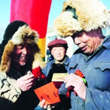CPPCC FAQs
- What kind of meeting mechanisms does the CPPCC employ?
- Meeting mechanism employed by the CPPCC include: the plenary sessions of the CPPCC National Committee or local committees, Standing Committee meetings, meetings of the chairmen, meetings of the secretary-generals, and meetings of the special committees.
- What are CPPCC motions and proposals?
- Motions refer to opinions and proposals on major issues covering state or local policies and social life put forward by members of CPPCC to CPPCC organizations and to the people's congress and people's government.
- Which parties and organizations can join the CPPCC?
- All political parties and public organizations that support the CPPCC charter may sit on the National Committee, after deliberation and approval by the Standing Committee of the CPPCC National Committee.
- Who participates in the management of state affairs?
- Various non-Communist political parties, democrats with no party affiliations and patriotic people are invited to take part in discussions on the management of state affairs.
- What form of democratic supervision does the CPPCC provide?
- Resolutions adopted by the plenary sessions of the CPPCC National Committee or Standing Committee, etc..
- What are the general principles guiding the work of CPPCC?
- Political consultation means that CPPCC conducts consultations on the country's basic policies and important issues relating to political, economic, cultural and social affairs before a decision is made and implemented.
- What's the difference between motions from CPPCC members and bills from deputies of people's congress?
- Motions from CPPCC members differ from bills of people's congress deputies. The people's congress is a body of power. A bill has legal effect once it has been adopted.
- When did representatives from non-state-owned enterprises first become members of the CPPCC National Committee?
- In March 1993, over 20 presidents and general managers from private businesses and joint ventures attended the First Plenary Session of the Eighth National Committee of CPPCC, representing the non-state economic sector.
- At which meeting do members of the National Committee and local committees of the CPPCC have the right to vote and stand for election? What other rights do they have?
- Members of the CPPCC National Committee and local committees have the right to vote and stand for election at meetings of CPPCC. They also have the right to voice their opinions and offer criticism on the work of CPPCC.
- What are the duties of CPPCC members?
- Abiding by the CPPCC charter, etc..
5316f3a5-a2e2-4786-8b9a-f4b8a8fb98e4.jpg)
- China.org.cn presents a live coverage of the opening ceremony of the first session of China's 13th National People's Congress (NPC) on the morning of March 5, 2018.
主站蜘蛛池模板:
奉新县|
锡林浩特市|
福贡县|
高邑县|
尤溪县|
济南市|
凤冈县|
论坛|
清苑县|
六盘水市|
青龙|
封开县|
鄂伦春自治旗|
任丘市|
康乐县|
江西省|
汨罗市|
彭州市|
屯昌县|
余干县|
怀来县|
徐水县|
大英县|
绥宁县|
南部县|
娄底市|
常宁市|
察隅县|
西乡县|
克拉玛依市|
武安市|
囊谦县|
闻喜县|
沙坪坝区|
山阴县|
泗洪县|
蛟河市|
开平市|
柳林县|
共和县|
抚宁县|
5316f3a5-a2e2-4786-8b9a-f4b8a8fb98e4.jpg)



